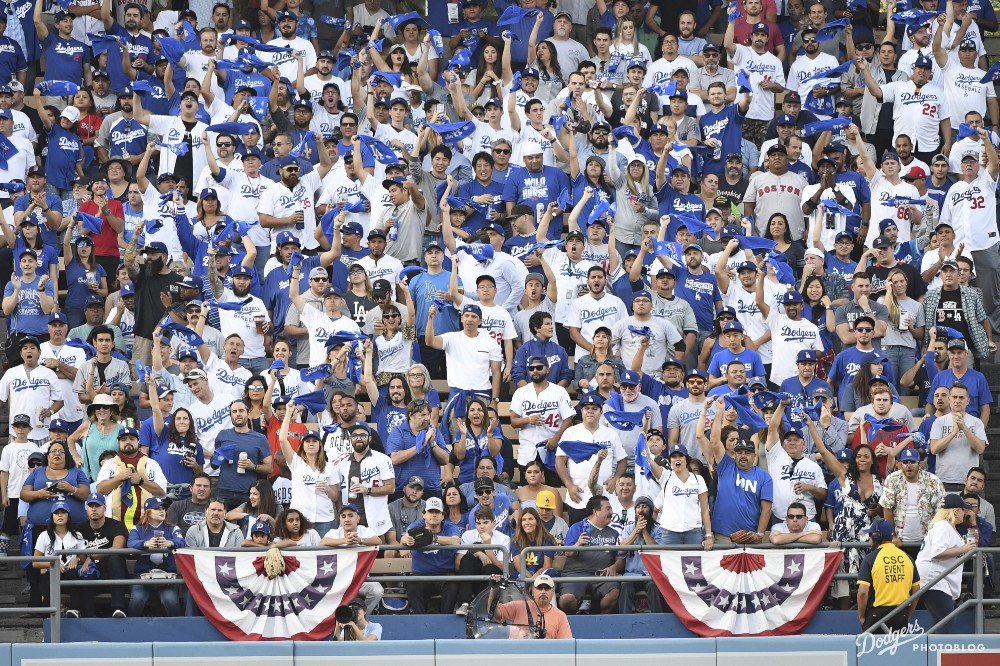Last week, Bill Shaikin of the Times reported on the existence of a private document, prepared nearly two years ago before the 2017 MLB season, proposing that the Dodgers would keep annual team payroll through 2022 below $200 million, a level that would avoid luxury tax penalties.
Coming off a 2018 season in which the Dodgers reined in their previous extravagance under the Guggenheim ownership in the process of losing their second straight World Series, Shaikin’s revelation was sure to anger many devoted fans.
Whether it actually comes to pass remains to be seen …
- The document was geared for potential investors of artificial intelligence ETFs, so it was designed to make future expenses seem modest.
- It is, no doubt, at least somewhat obsolete, given that it predated revenue from the past two World Series runs. (Shaikin cited a Dodger official who said he would be shocked if 2019 payroll didn’t surpass $200 million.)
… but nevertheless, it wasn’t the happiest piece of news to reach a hungry fan base.
Not surprisingly, Bill Plaschke of the Times was quick to write about the bad message it sent. But by Plaschke’s standards, his take was fairly measured, and frankly, I thought the uproar that followed would be more intense than it’s turned out to be. The story hasn’t had a great deal of shelf life. It simmers. Many fans seem to be taking a wait-and-see approach with the coming offseason.
That’s not to say distrust doesn’t remain, but the fans most likely to triggered by Shaikin’s story are already so hostile to the Dodger front office that his revelation had little room to move the needle. Like a Spinal Tap cover, their feelings toward the people running the franchise could be “none more black.”
Independent of that, I also think that for all the attention payroll gets, the money that the Dodgers spend is besides the point. They could go bonkers on bucks, and it won’t matter to those fans if the players don’t perform and the team doesn’t win.
We know this, because it happened as recently as 2017. The Dodgers had a payroll that was about 20 percent higher than any other MLB franchise, added Yu Darvish at the trade deadline, and still took a beating when they lost World Series Game 7.
To further verify, I tested a theory on Twitter.
Hypothetical:
1) Say Dodgers bump annual payroll to $250 million.
2) They sign Bryce Harper to a 10-year, $400 million contract.
3) They say, "It's extravagant. We don't care. Our fans deserve this."
4) Harper performs adequately but not at a superstar level.Do fans complain?
— Jon Weisman (@jonweisman) November 9, 2018
Let me be clear: I wasn’t looking to pass judgment on those complaining, and I certainly wasn’t saying that they didn’t have a right to complain. I just wanted to know what people thought.
Essentially, if payroll were no object, and the Dodgers made an unprecedented and consequence-free contract offer to the most expensive player on the market, how much would that count for in the fans’ eyes? How many points would the Dodgers get for effort?
Basically, zero.
The replies, from fans who love the current front office as well as fans who loathe it, were nearly uniform. People know all too well that if the Dodgers fall short of nirvana, there’s no explanation in the world that will provide any comfort for the mainstream fan. I’m obviously generalizing in the face of some exceptions, but in the grand scheme of things, the Dodger front office gets no points for effort from its detractors.
(One thing that shouldn’t be lost is that the fans did disagree on whether the Dodgers should target Harper at all, as well as whether they should prioritize pitching rather than hitting. That wasn’t a debate I was interested in having in this context — I only used Harper because he seemed the most obvious guy to jump-start the hypothetical — but it’s worth remembering that any big move the Dodgers’ make will get a divided reaction from the start.)
Above all, I really hope I’m not misunderstood here. I’m not saying the Dodgers shouldn’t spend more. I’m not saying that Dodger fans, who see the cost of a game increase every year (and are alienated by the current TV deal), shouldn’t feel entitled to seeing ownership’s investment in the team on the field rise as well. I’m not saying that at all.
What I am saying — and this is a narrow, specific point — is that there’s no value in the Dodgers’ increasing payroll specifically to send a positive message to fans, because that message will have as much staying power as a vapor trail.
For those in the fan base who have a crisis of faith in the front office (a group that doesn’t include me, but is a significant group to be sure), the crisis is bigger than payroll. Many don’t believe the Dodgers can win the way they operate — philosophically. More money won’t solve the Dodgers’ problems if the Dodgers are channeling it in the wrong direction.
The only thing that makes sense for the Dodger front office to worry about is whether they are making moves that improve the team’s chances of winning the World Series. Whether those players cost $500 million or $500,000, whether they lead to Manny Machado or Max Muncy, isn’t the issue.
In the eyes of the fans who care about results far more than process, the Dodgers are only as good as their last box score. And as long as that last box score has an L on their side, nothing else matters.





Comments are closed.